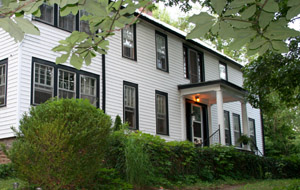In the bosom of the South there once existed the most progressive art school in the nation, Black Mountain College. It was a crucible for the modern art movement right in the midst of the country folk arts still found throughout the region. Why here? It’s been an enclave of tolerance from way back. Perhaps the friendly mountain attitude of live and let live—a trait of the original Scotch-Irish settlers—fostered this climate of creative individualism in an isolated setting.
Black Mountain College was founded in 1933 by critics of a rigid higher education system. The arts were placed at the center of the curriculum. Its influence still reverberates today, decades after its closure in 1957.
Though the college was only active for twenty-four years, its faculty and students (including Robert Rauschenberg, Willem de Kooning, Arthur Penn, and Robert de Niro) became luminaries in American art, literature, music, acting, dance, and architecture. Albert Einstein and William Carlos Williams served on the Board. Here young architect Buckminster Fuller erected his first geodesic dome from Venetian blinds, musician John Cage and dancer Merce Cunningham staged the first “happening,” and writer Allen Ginsburg saw himself in print.
Today’s Asheville artists working in the old industrial section of town have been spared from the gentrification that would have driven them out of affordable spaces. Many studios are open to the public. The city has preserved its Art Deco buildings, which some say rival those of Miami. The college itself was located in Black Mountain, a throwback to small-town America 15 miles east of Asheville. One of the oldest structures in town (listed on the National Registry) boasts its own personal art history.
The college itself was located in Black Mountain, a throwback to small-town America 15 miles east of Asheville. One of the oldest structures in town (listed on the National Registry) boasts its own personal art history.
In the 1940s, at the height of the college’s fame, the inn was purchased by a well-known art dealer from Palm Beach for use as her summer studio. Her famous clientele loved the rustic respite. Today, you can sleep in the same space once used by Helen Keller, Norman Rockwell, and Ernest Hemingway, as the current owner returned the building to its original function. From there you can imbibe the ambiance of a region rich in art, as well as natural beauty, outdoor activities, golf, and historical significance.
Black Mountain College Museum and Arts Center
54 Broadview
Asheville, NC 28801
828.350.8484
www.blackmountaincollege.org
Open Wed.-Sat. 12-4 pm
Black Mountain Inn
1186 West Old Highway 70
Black Mountain, NC 28711
www.blackmountaininn.com
800.735.6128
The Spirit of Black Mountain College
Local and regional arts organizations from Hickory, Asheville, and Charlotte
Lenoir-Rhyne College
Hickory, NC 28601
http://www.blackmountaincollegecelebration.com/visitors.htm